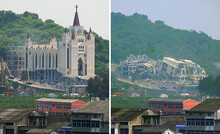The past several years have witnessed a shift in Chinese state policy regarding religion and the gradual diminishment of the state’s relative lenience towards religion In the early reform era. Much of the change is focused on visibility and public spaces, including the removal of crosses, the remodeling of mosques and the destruction of large Buddhist and Daoist statues. Based on Henri Lefebvre’s theory of state space production, this lecture is an attempt to examine the changes of the past decade focusing primarily on Christianity and Islam and the ways in which Chinese authorities under president Xi are reconstructing state and religious spaces and the possible implications for religious communities and for China’s modernization process.——————————-Gideon Elazar is a lecturer in Bar Ilan University Asia Track and a researcher in the Ariel University Eastern Research and Development Authority. His PhD, received from the Haifa University Asian Studies Department, is based on ethnographic fieldwork conducted among Protestant missionaries in Southwest China. A book based on his dissertation titled The Missionaries Return: Christianity, Ethnicity and State Control in Globalized Yunnan is due to be published by Pennsylvania University Press this year. His research and publications deal with religion, ethnicity and identity in contemporary China and Israel as well as the cultural interaction between Israel and East Asian societies. He is currently a visiting scholar at the YDS and is working on Chinese Christians and their relationship with Israel.
The Sinicization of Space: Religion and Space Production Xi Jinping’s China
Event time:
Tuesday, November 15, 2022 - 4:30pm to 6:00pm
Location:
Henry R. Luce Hall LUCE, 203
34 Hillhouse Avenue
New Haven, CT
06511
Speaker/Performer:
Gideon Elazar - Lecturer, Bar Ilan University Asia Track; Researcher, Arial University Eastern Research and Development Authority
Event description:
Admission:
Free
Contact:
Council on East Asian Studies
Sponsor:
Council on East Asian Studies
